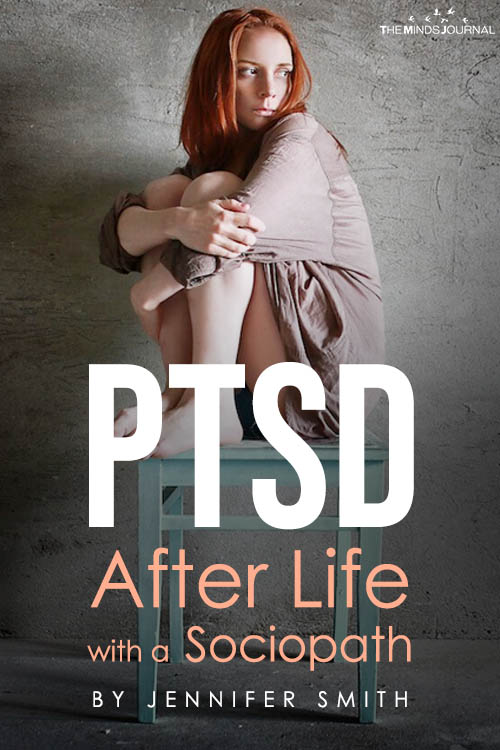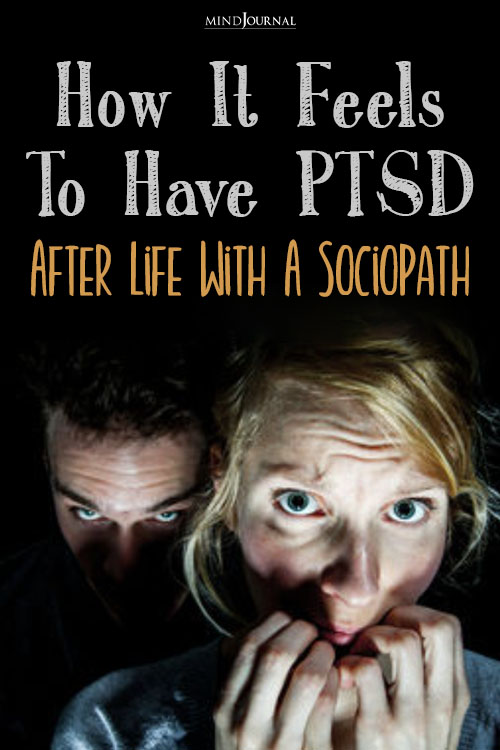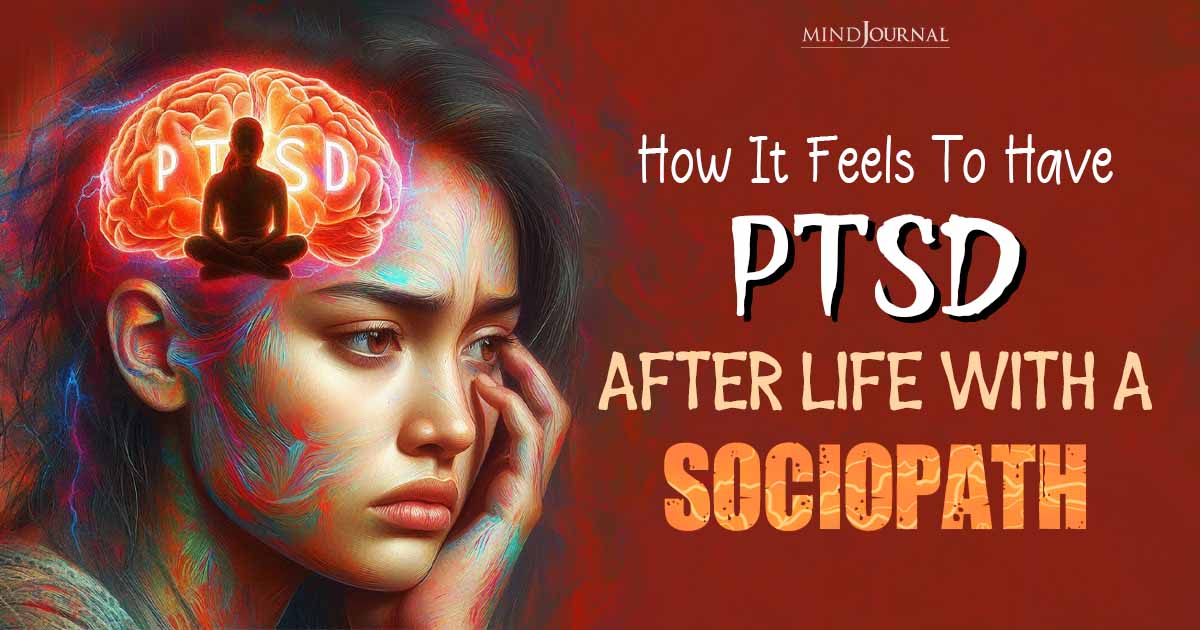Life with a sociopath can mess you up in ways most people can’t even imagine. PTSD is one of the most heart-breaking and disturbing after-effects of being with a sociopath. This article is going to explore the world of PTSD after a sociopath.
PTSD is most definitely a thing. After narcissistic abuse, we have it. Our friends don’t understand. Maybe we don’t, but: we’re not really broken.
PTSD stands for post-traumatic stress disorder. PTSD isn’t permanent. It might surprise some of us that the range of swinging emotions and thoughts were going through is PTSD.
It may surprise our family or friends to realize that the pain, the terror, that broken feeling and all the weepy confusion is post-traumatic stress.
PTSD is a thing after a sociopath or a narcissistic abuser. What we’re feeling is normal, unavoidable, not permanent and there are hope and healing.
Related: Complex-PTSD: Recovery In Psychotherapy For Survivors Of Narcissistic Abuse
Everything We Feel Is Normal And Not Permanent After Life With A Sociopath: We Are Not Broken Forever
Here’s the thing, any time spent around a sociopath is traumatic. So, after they leave, we’re going to go through feelings that are more than uncomfortable.
These intense and conflicting thoughts, emotions and despair are the beginning of healing, not the end of our life as it used to be before we met them
We’re Really Going to be Okay – PTSD is not Permanent
So many people around us tell us to: Move on. Or, Get over it. We try to do that, but somehow instead we can’t sleep, have lost weight, feel like we’ll never trust again and a whole bunch of other not great feelings, worries, and fears.
Memories of this creep won’t stop. We’re so worn out of thinking about this loser, yet we can’t not think about this loser. – That’s normal. And it’s because we need answers to what the heck happened.
PTSD and CPTSD are Part of Healing: The Beginning of Healing
Imagine we just got hit by a freight train, no one gets up and walks away from that without recovery.
Here’s a tiny example of what PTSD is, think of this: Have you ever almost been in a car accident? Driving along normally and suddenly, there’s almost a mash-up? Then you keep driving, but tingles run through your hands, and they shake on the steering wheel, palms sweating, breathing shallow.
Driving along because the traffic lights are green and we have somewhere to be, we try to act normally. But our heart pounds, our blood rushes, and images of what just happened run on a loop in our mind.
Which is only partly there and is off on its own someplace kind of floaty and yet we feel sharply aware at the same time.

Then, in the aftermath of nearly getting into a head on collision, our emotions keep swirling. Nearly as we feel all these emotions, the emotions turn to thoughts. We start forming ideas and thoughts and beliefs about what just happened immediately and quite naturally after the traumatic event.
And, significantly, these ideas and thoughts and beliefs in our head are pulled from things we already “know” and “believe” about life and about ourselves.
Hearing the word “sociopath” is only the beginning. That’s when recovery can begin. After the trauma of a hijacking by a sociopath, our emotions and thinking are all over the place because the trauma deregulates our nervous system.
If we take in the effective methods of re-regulating our nervous system and other specific insights, we can fully recover.
Related: 5 Ways To Disarm A Love Bombing Sociopath
Feelings Become Thoughts Become Beliefs: We Can Decide What We Think and Believe
From the feeling of fear, for example, our brains make a thought that forms into words in our head, such as, “Wow, what an idiot that another driver is!” Or maybe, “I almost hit that guy! What’s wrong with me?!“
The emotions take us to a conclusion or belief about what happened, or about ourselves. We might likely conclude it was our fault, and we just did something stupid.
At the same time in another part of our mind, we wonder what our mom would say about our (bad) driving. Or what would have happened if our child had been in the car with us?
We’re usually really hard on ourselves when things go wrong in life. Any time spent with a con man, a sociopath, is traumatic, we sustain prolonged traumatic injury. Then we go through post trauma afterward. This is unavoidable.
We decide what winning is for our life in the aftermath, and post-trauma. We decide what’s next. Post-trauma isn’t the “new us.
We Know Somethings Wrong But We Don’t Know What: This is Normal
Though we aren’t sure of exactly what just happened or how for most people our natural first thoughts are related to taking responsibility for what happened. We’re usually really hard on ourselves when things go wrong in life.
We worry about what could have happened (but didn’t) and think about what we should have done instead of whatever it was we just did. All this is going on while we’re aware we need to refocus on driving… so this won’t happen again. Sound familiar…?
This is what post-trauma is. It isn’t who we are. It’s the bodies natural delay from traumatic event to the beginning of healing. It’s a kind of debriefing. We take in and review the trauma so that we can feel safe again, and skip another such close call in the future.
It’s up to us in this case with a con man to learn how to manage the debriefing, the post-trauma so that we come out whole, healed and with every answer to what happened. And, the good news is, the answers are here.
Post-traumatic stress is the unavoidable fallout of the aftermath of time spent with a sociopath. We aren’t permanently broken. This is temporary. PTSD is the normal result of trauma, and we can recover. There are specific, effective methods and perspectives that heal PTSD after a sociopath.
Hearing the word “sociopath” is only the beginning. That’s when recovery can begin. After the trauma of a hijacking by a sociopath, our emotions and thinking are all over the place because the trauma deregulates our nervous system.
If we take in the effective methods of re-regulating our nervous system and other specific insights, we can fully recover.
Related: 6 Diversion Tactics Used By Sociopaths, Narcissists, and Psychopaths to Manipulate You Into Silence
PTSD is the Beginning of Healing From Trauma

We’ll feel all or some of the following things in PTSD after a sociopath: Profound fear. Weepiness and physical weakness. Sorrow, grief, despair, depression. Inability to concentrate on daily things, and our minds flood with thoughts of what happened.
There’s extreme and sudden weight loss or weight gain. Illness. Fatigue, abnormal sleep patterns, sleep in the day, but unable to sleep at night, waking in the early morning and not being able to sleep again, can’t sleep at all or sleep all the time. Nightmares.
Post-trauma can include fear of going places that hold memories related to them. Terrorizing recall of scenarios with them. Confusion, indecision, and doubt. Emphatic desire to leave, move, change jobs or make drastic change… it affects our body and mind. We might miss them so much we feel like we could die. We feel broke.
Trauma is… “Anything less than nurturing. An event or experience that changes your vision of yourself and your place in the world.” – Judy Crane
Healing Comes in Stages – Time is On Our Side
In PTSD we’re in shock, scared to death, sad, confused, wanting to die, crying all the time. We feel alone, or want to isolate ourselves. There’s a heavy feeling in our bones and hearts; it’s overwhelming and the word “stress” doesn’t begin to describe it.
We’re grief-stricken and wondering why this happened. Feelings that it’s our fault haunt us as we also wonder if we’ll ever smile again, or ever love again.
We wonder how to get from broken to normal. There’s no other way a person can feel after a collision and entanglement with a sociopath.
This is the only possibility when we are ensnared by one of these people, a con a man, a sociopath and the profound clash with our emotional way of life.
The recovery of true love scam comes in phases stages. Patience and self-love are necessary. Spending time only with those who truly love us is a part of the cure.
Establishing and maintaining no contact with the con artist who hijacked our lives is essential. There is without a doubt hope after a sociopath or a narcissist.

There’s Nothing Wrong with Us – There’s Everything Right with Us
Hearing the word “sociopath” is only the beginning. That’s when recovery can begin. After the trauma of a hijacking by a sociopath, our emotions and thinking are all over the place because the trauma deregulates our nervous system.
If we take in the effective methods of re-regulating our nervous system and other specific insights, we can fully recover.
We can recover, we do heal when we find answers. One of the most important things we can do is find the way to gradually realize that, though this happened in our lives, to us, this wasn’t personal.
Love, and affection, and then betrayal had nothing to do with it. It looked like love, but it wasn’t.
Related: The One Thing Critical To Successful Healing From Emotional Trauma
It was a raid, a home invasion, a breaking and entering through our hearts. This wasn’t a relationship, it was a crime. – And keep in mind: No one robs an empty house. We are awesome.
Jennifer Smith, founder of True Love Scam Recovery and https://www.truelovescam.com is an author, public speaker, and international private recovery coach and holds support groups in Los Angeles for those coming out of narcissistic abuse and fraud relationships. Guest contributor to Becoming the Narcissist’s Nightmare.
Hear Jennifer interviewed on Mental Health News Radio. Find Jennifer on Instagram @truelovescamrecovery, @truelovescamrecovery_health, and @jennifer_smith_tlsr On Facebook and Pinterest Reach Jennifer at, jennifer@truelovescam.com – Jennifer Smith is a pen name.
Written By Jennifer Smith
Originally Appeared On True Love Scam
Republished with permission.












Leave a Reply